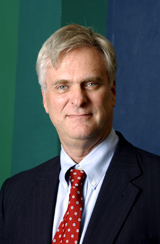|
May 11, 2004 A
video
clip of Dean Antel's is interview available.
A
CLASS act: Dean John Antel setting his sights on excellence
 After
providing leadership to the largest and most academically diverse
college at the University of Houston on an interim basis, John Antel
recently was named dean of the College of Liberal Arts and Social
Sciences (CLASS). During his tenure as interim dean, Antel not only
pushed the college’s initiatives forward but also helped secure
a $20 million gift from the George and Cynthia Woods Mitchell Foundation,
establishing the Cynthia Woods Mitchell Center for the Arts. UH
Campus News spoke with Antel about his successes to date as well
as his future plans for CLASS. After
providing leadership to the largest and most academically diverse
college at the University of Houston on an interim basis, John Antel
recently was named dean of the College of Liberal Arts and Social
Sciences (CLASS). During his tenure as interim dean, Antel not only
pushed the college’s initiatives forward but also helped secure
a $20 million gift from the George and Cynthia Woods Mitchell Foundation,
establishing the Cynthia Woods Mitchell Center for the Arts. UH
Campus News spoke with Antel about his successes to date as well
as his future plans for CLASS.
Q
Now that you’re dean, what are your goals for the
college?
A In a word,
excellence — faculty, students, programs. As dean, I see myself
in a service role providing the resources that will help achieve
that level of intensity. There is an incredible amount of talent
here, and I hope to mobilize what we already have and build upon
that.
Q
What role will the $20 million endowed Cynthia Woods Mitchell
Center for the Arts play?
A The Cynthia
Woods Mitchell Center for the Arts will be a catalyst for the college,
as five programs will join forces. The Art Department, the Blaffer
Gallery, the Creative Writing Program, the Moores School of Music
and the School of Theatre will collaborate and provide a center
of excellence for the community and the arts. It will give the college
a new presence.
Q
Fall 2004 will mark the fourth anniversary of the merger
of the College of Humanities, Fine Arts and Communication and the
College of Social Sciences. What’s working and what isn’t?
A We have
moved beyond the merger. More and more faculty members from all
departments have come together to speak with one voice on how to
improve CLASS. For example, professors from various departments
are working together on committees to improve the curriculum. Still,
with more than 8,000 majors, 14 departments and 20 programs, we
need to continue to build a sense of identity for the college. Slowly,
even neoclassical economists and postmodernist poets find common
ground. In spite of the differences, all of CLASS is committed to
improving undergraduate education and to establishing UH as a Tier
One research university.
Q
What type of curriculum changes are you considering?
A Every UH
student should have an intensive writing experience. We must not
stop at English composition and literature classes. Writing should
be integrated within each discipline so that the experience is in
context. In the future, students may be required to write even more
papers within their major field of study.
Q
Colleges across campus have reported a faculty shortage.
How is CLASS faring?
A Like other
colleges on campus, CLASS is not immune from the faculty famine.
Probably the departments hardest-hit are theatre and psychology,
but we are working to fill the vacancies with quality hires there
and in many other areas. Collegewide, we are hiring more clinical
faculty and fewer adjuncts, as clinical professors are more available
to students and committed to quality instruction.
Q
Alumni are vital to the success of universities. What role
will alumni play in creating a new level of excellence for CLASS?
A Alumni
are underutilized and underappreciated. We hope to incorporate them
more into the college’s activities. Already, they are involved
in graduation receptions, but we hope they will take on a more active
role, particularly in networking and fund-raising. Most importantly,
networking will help CLASS students obtain jobs and other invaluable
opportunities.
Q
Is it important that students from other colleges continue
to take CLASS core courses? Or, should students be allowed to focus
more on their areas of study instead?
A That is
really a question of whether we are in the business of vocational
training or liberal arts education. I advocate the latter. No matter
what a student’s field is, he or she will need the tools of
a liberal arts education in order to be an effective employee and
citizen. In the global economy, it is not just learning a specific
discipline, it is “learning how to learn.” That is what
a liberal arts education is about.
Q
UH recently announced a tuition increase, but students
taking core classes on Saturdays receive a discount. Will this alleviate
class crowding during the week and promote greater support for Saturday
courses?
A We are
extremely sensitive to tuition increases. The discount for Saturday
core classes is an example of what economists call congestion pricing,
charging premium prices for peak times. We hope the discount will
influence students to take classes during nonpeak times and to take
advantage of the additional parking and classroom resources available.
Looking forward, we hope to create an afterhours college community,
where classes are clustered in the same area or buildings, career
counseling hours are extended and a coffee bar is opened. This program
will save students money and allow us to use our scarce space more
efficiently. If successful, maybe we won’t have to build as
many new buildings, thus saving students and parents even more money.
That is our plan.
|
